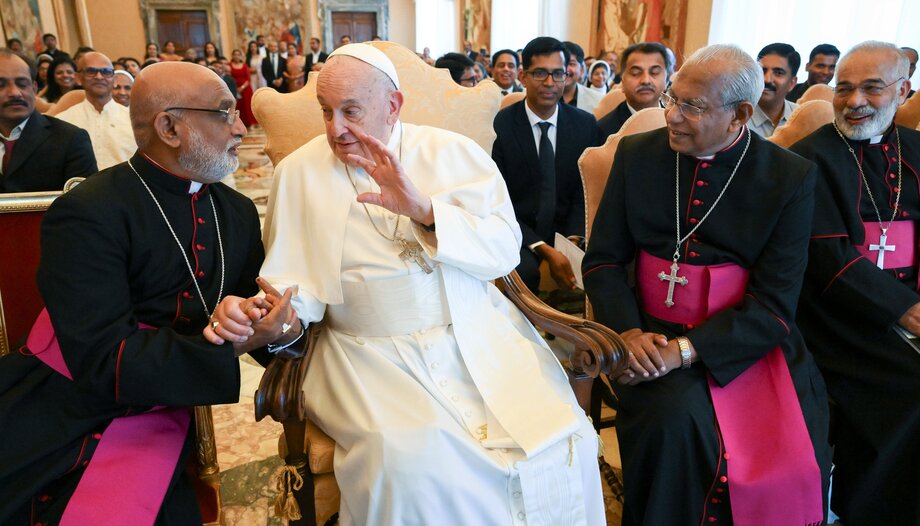– Supernatural Syro-Malabar Catholic Churchbased in Kerala (India), is one of the oldest Christian communities in the East, founded according to tradition by the Apostle Thomas. With more than five million believers and a strong institutional presence, this Church plays an important role both in the spiritual life of its members and in the social and cultural fabric of the country. In recent years, however, it has been overwhelmed by a series of scandals and controversies that have deeply undermined the confidence of the faithful and called into question its institutional credibility.
This climate of mistrust was analyzed and documented in detail by student Nibin Thomas, who last Monday presented his doctoral thesis at the School of Institutional Social Communication of the University of California at La Paz. Pontifical University of the Holy Crossdirected by Professor Juan Narbona.
Through the analysis of specific cases and the responses of a sample of catechists in the archieparchy of Ernakulam-Angamaly - 5,332 catechists, of whom 767 are nuns, 14 priests and 156 seminarians - the research basically showed how inadequate crisis management by church authorities has fueled a sense of insecurity and distrust among the faithful, leading to the erosion of trust in the church hierarchy itself.
The impact of scandals on confidence
The succession of scandals - cases of sexual abuse, financial scams and accusations of cover-ups - has devastatingly eroded perceptions of trust in the Syro-Malabar Church, Thomas' research shows. Indeed, 83.8 % of respondents said these events had generated an unprecedented crisis; more than 77 % confirmed that the controversies had compromised their personal relationship with the Church, perceiving a growing disconnect between the institution and the values of transparency and justice it should embody.
A key element contributing to the erosion of trust is the perception that the Church hierarchy has mishandled these crises. Not surprisingly, 73.4 % of respondents believe that the authorities have tried to protect the perpetrators and cover up the crimes, instead of dealing with them with transparency and moral rigor. This sense of protecting the guilty was interpreted as a betrayal of expectations of truth and justice. Institutional communication itself was perceived as insufficient, with 65.9 % of respondents disagreeing with the methods of information used by the Church during the crises.
The role of social networks
In fact, the digital revolution and social networks have amplified the impact of scandals. According to 74.6 % of the catechists interviewed, also based on their personal experience, the diffusion of these tools has undoubtedly aggravated controversies, obviously favoring the spread of often negative news in a viral way.
At the same time, it reveals the lack of preparedness of ecclesiastical bodies to respond to these information flows in a timely and adequate manner. A scenario, reads Thomas' thesis, "that highlights the need for a proactive and strategic approach to communication on the part of the Syro-Malabar Church, not only to disprove possible fake news, but also to foster a transparent narrative that can regain the trust of the faithful."
Food for thought
The study presented at the University of the Holy Cross clearly provides food for thought that can also be applied to other ecclesial contexts. In an increasingly connected and transparent world, ecclesiastical institutions are called to review their methods of crisis management and their way of communicating in general. The loss of trust, in fact, is an important reminder to promote a culture of accountability, dialogue and listening, crucial elements for rebuilding those bonds of belonging that have been compromised by what has happened.
Undoubtedly, it is necessary to learn to avoid cover-ups, to act decisively against the perpetrators and to communicate with clarity and transparency. These elements, in addition to restoring trust, can foster genuine reconciliation in the community.
Intervention by the Holy See
On this front, it should be recalled that the situations and internal divisions experienced by the Archdiocese of Ernakulam-Angamaly in recent years even required the intervention of the Holy See. In 2023, Pope Francis had expressed in a video message his concern for the conflictive situation that had arisen around the way of celebrating the liturgy, encouraging the archbishopric to a path of unity and renewal.
Previously, in 2021 and 2022, he had addressed two letters to bishops, priests, religious and laity, in which he exhorted the community to "walk together with the people of God because unity overcomes all conflict." Unity that must be rebuilt hand in hand with the recovery of trust.





 Pope may excommunicate 400 priests of the Eastern Rite Siro Malabar
Pope may excommunicate 400 priests of the Eastern Rite Siro Malabar





